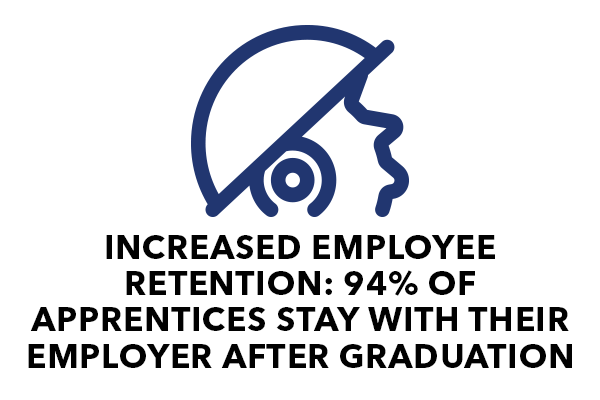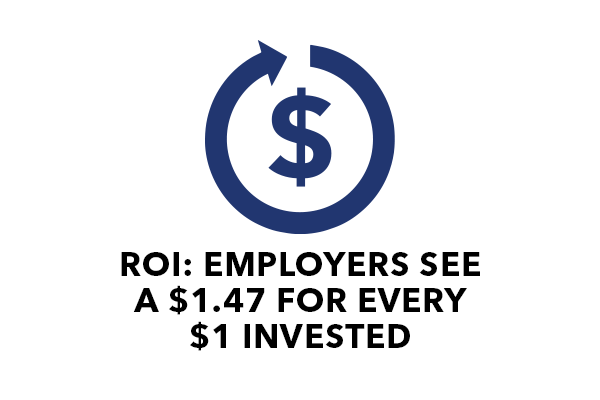Benefits to Employers
- Highly skilled employees
- Reduced turnover costs
- Lower investment in recruitment
- Higher productivity
- More diverse workforce



Create your future workforce, improve productivity, and reduce turn-over with a high-quality
apprenticeship program.
How does my business start an apprenticeship program?
Explore Apprenticeship
Learn about the benefits of apprenticeship across industries and geographies, view
how others have leveraged apprenticeship as a talent solution, and discover more about
successful apprenticeship programs.
Start Creating a Program
Connect with apprenticeship experts using the Partner Finder to help design and register your program, determine the right model for your organization,
build strong partnerships, and obtain resources to create, sustain, and expand your apprenticeship
program.
Promote Your Apprenticeship Program
Use the Apprenticeship Finder to list your open apprenticeship positions to make sure the right job seekers find
your program, connect with partners to enhance the core components of your program,
and leverage competency-based frameworks to expand your program to other occupations.
Apprenticeships Can Improve Your Bottom Line
- Employment – Apprenticeship is a job, so job seekers enter employment when they begin an apprenticeship
program.
- Retention – Apprenticeship programs have high retention rates 94% of apprentices retain employment
after the program ends.
- Return on Investment - Apprenticeships can generate a return on investment of 10%-30%.
- Earnings – Average starting apprentice wage is $16.00 per hour in Michigan. Graduates earn
an average of $70,000 per year.
- Credential Attainment – All apprentices earn a national-recognized credential or journeyperson card.
- Measurable Skill Gains – This interim progress measure supports multiple opportunities for a positive outcome
(e.g., completion of 1st year of on-the-job learning).
Several funding options are available for companies participating in Registered Apprenticeship,
including state, federal and local programs. Funding for apprentices may also be available
through the GI Bill® for Veterans, as well as Pell Grants or scholarship funds. These
can be applied toward instruction, as well as leveraged for other portions of the
program.
GI Bill® is a registered trademark of the U.S. Department of Veterans Affairs (VA). More information
about education benefits offered by VA is available at the official U.S. government website.
While many apprenticeships focus on new talent, the programs can also be applied to
current or incumbent employees as means to improve or build upon existing labor skills.
Apprenticeship Industries
Apprenticeship is a flexible training model that can be customized to meet the needs
of businesses across multiple industries. Some industries with apprenticeship programs
include:
- Advanced Manufacturing
- Information Technology
- Healthcare
- Hospitality
- Cybersecurity
- Energy
- Engineering
- Transportation
- Construction
- Financial Services


